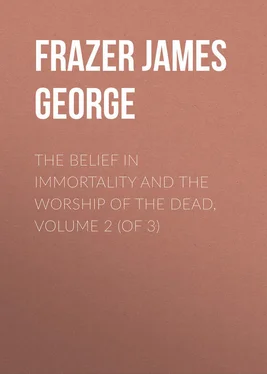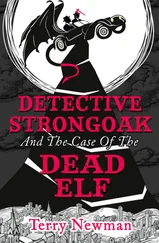James Frazer - The Belief in Immortality and the Worship of the Dead, Volume 2 (of 3)
Здесь есть возможность читать онлайн «James Frazer - The Belief in Immortality and the Worship of the Dead, Volume 2 (of 3)» — ознакомительный отрывок электронной книги совершенно бесплатно, а после прочтения отрывка купить полную версию. В некоторых случаях можно слушать аудио, скачать через торрент в формате fb2 и присутствует краткое содержание. Жанр: foreign_antique, foreign_prose, на английском языке. Описание произведения, (предисловие) а так же отзывы посетителей доступны на портале библиотеки ЛибКат.
- Название:The Belief in Immortality and the Worship of the Dead, Volume 2 (of 3)
- Автор:
- Жанр:
- Год:неизвестен
- ISBN:нет данных
- Рейтинг книги:3 / 5. Голосов: 1
-
Избранное:Добавить в избранное
- Отзывы:
-
Ваша оценка:
- 60
- 1
- 2
- 3
- 4
- 5
The Belief in Immortality and the Worship of the Dead, Volume 2 (of 3): краткое содержание, описание и аннотация
Предлагаем к чтению аннотацию, описание, краткое содержание или предисловие (зависит от того, что написал сам автор книги «The Belief in Immortality and the Worship of the Dead, Volume 2 (of 3)»). Если вы не нашли необходимую информацию о книге — напишите в комментариях, мы постараемся отыскать её.
The Belief in Immortality and the Worship of the Dead, Volume 2 (of 3) — читать онлайн ознакомительный отрывок
Ниже представлен текст книги, разбитый по страницам. Система сохранения места последней прочитанной страницы, позволяет с удобством читать онлайн бесплатно книгу «The Belief in Immortality and the Worship of the Dead, Volume 2 (of 3)», без необходимости каждый раз заново искать на чём Вы остановились. Поставьте закладку, и сможете в любой момент перейти на страницу, на которой закончили чтение.
Интервал:
Закладка:
It is easy to see that this form of taboo must have greatly contributed to create and confirm respect for the rights of private property. The most valuable articles might, we are told, under ordinary circumstances be left to its protection in the absence of the owners for any length of time. 121 121 Old New Zealand , by a Pakeha Maori, p. 97.
Indeed so obvious and so useful is this function of taboo that one well-informed writer supposes the original purpose of the institution to have been no other than the preservation of private property; 122 122 Old New Zealand , by a Pakeha Maori, p. 94.
and another observer, after eulogising its beneficent effects, declares that "it was undoubtedly the ordinance of a wise legislator." 123 123 E. Dieffenbach, Travels in New Zealand , ii. 100, "Ridiculous as this custom of the tapu has appeared to some, and as many of its applications really are, it was, notwithstanding, a wholesome restraint, and, in many cases, almost the only one that could have been imposed; the heavy penalties attached to the violation of its laws serving in one tribe, or in several not in actual hostility with each other, as moral and legal commandments. It was undoubtedly the ordinance of a wise legislator." Compare G. F. Angas, Savage Life and Scenes in Australia and New Zealand , i. 330, "Doubtless this law is the result of some wise regulation for the protection of property and individuals, and it has in many things a beneficial influence amongst a people who have no written or regularly established code of laws of their own." To the same effect another authority on the Maoris observes: "The most politic and useful of all the superstitious institutions of the Maori people is that which involves the rites of tapu . It has always seemed to me that this institution, with its far-reaching ramifications, must have been the conception of a very gifted mind, for, as a governing factor, it is very superior to the Hindu institution of caste. It must, moreover, have been initiated during a period of civilisation, to which the Polynesians have long been strangers, but with which at one period of their history they were sufficiently familiar." See Lieut. – Colonel Gudgeon, "The Tipua-Kura and other Manifestations of the Spirit World," Journal of the Polynesian Society , vol. xv. no. 57 (March 1906), p. 49.
But to say this is greatly to overrate the wisdom and foresight of primitive man in general and of the Polynesians in particular; it implies a fundamental misconception of the real nature and history of taboo. That curious institution was not the creation of a prudent and sagacious legislator, who devised this system of checks and restrictions for the purpose of curbing the passions of a savage race and inducing them to submit to the salutary restraints of law and morality. It was in its origin, I believe, simply a crude and barbarous form of superstition, which, like many other superstitions, has accidentally led to good results that were never contemplated by its ignorant and foolish votaries. It is thus that in the long history of mankind things which to a contemporary spectator might seem to be almost unmitigated evils turn out in the end to be fraught with incalculable good to humanity. This experience, often repeated, enables students of the past to look forward, even in the darkest hours, with cheerful confidence to the future.
The particular superstition which lies at the root of taboo and has incidentally exercised a beneficent influence by inspiring a respect for law and morality appears to be a belief in the existence of ghosts and their power to affect the fortunes of the living for good or evil. For the ultimate sanction of the taboo, in other words, that which engaged the people to observe its commandments, was a firm persuasion that any breach of these commandments would surely and speedily be punished by an atua or ghost, who would afflict the sinner with a painful malady till he died. From youth upwards the Maori was bred in the faith that the souls of his dead ancestors, jealous of any infraction of the traditionary rites, would commission some spirit of their kin to enter into the transgressor's body and prey on a vital part. The visible signs of this hidden and mysterious process they fancied to be the various forms of disease. The mildest ailments were thought to be caused by the spirits of those who had known the sufferer on earth, and who accordingly were imagined to be more merciful and more reluctant to injure an old friend and relation. On the other hand the most malignant forms of disease were attributed to the spirits of dead infants, who having never learned to love their living friends, would rend and devour the bowels of their nearest kin without compunction. With these ideas as to the origin of disease the Maoris naturally did not attempt to heal the sick through the curative properties of herbs and other drugs; their remedies consisted not in medicine but in exorcism: instead of a physician they sent for a priest, who by his spells and incantations undertook to drive the dangerous sprite from the body of the patient and to appease the ancestral spirit, whose wrath was believed to be the cause of all the mischief. If the deity proved recalcitrant and obstinately declined to accept this notice to quit, they did not hesitate to resort to the most threatening and outrageous language, sometimes telling him that they would kill and eat him, and at others that they would burn him to a cinder if he did not take himself off at once and allow the patient to recover. 124 124 E. Shortland, The Southern Districts of New Zealand , pp. 30 sq. , 294 sq. ; id. , Traditions and Superstitions of the New Zealanders , pp. 114 sqq. ; id. , Maori Religion and Mythology , 31 sq. ; W. Yate, An Account of New Zealand , pp. 141 sq. Most malignant and dangerous of all appear to have been thought the spirits of abortions or still-born infants. See Elsdon Best, "The Lore of the Whare-Kohanga ," Journal of the Polynesian Society , vol. xv. no. 57 (March 1906), pp. 12-15; Reise der Oesterreichischen Fregatte Novara um die Erde, Anthropologischer Theil, Dritte Abtheilung, Ethnographie , bearbeitet von Dr. Fr. Müller (Vienna, 1868), pp. 59 sq. Even more dangerous than the spirits of dead infants were supposed to be the spirits of human germs, which the Maoris imagined to exist in the menstrual fluid. See E. Shortland, Traditions and Superstitions of the New Zealanders , pp. 115, 292; id. , Maori Religion and Mythology , pp. 107 sq. As to disease inflicted by ancestral spirits ( atuas ) for breaches of taboo, see further J. L. Nicholas, Narrative of a Voyage to New Zealand (London, 1817), i. 272 sq. , ii. 176 sq. ; E. Dieffenbach, Travels in New Zealand , ii. 105, "The breaking of the tapu , if the crime does not become known, is, they believe, punished by the Atua , who inflicts disease upon the criminal; if discovered, it is punished by him whom it regards, and often becomes the cause of war."
Curiously enough, the spirit which preyed on the vitals of a sick man was supposed to assume the form of a lizard; hence these animals, especially a beautiful green species which the Maoris called kakariki , were regarded with fear and horror by the natives. 125 125 Richard A. Cruise, Journal of a Ten Months' Residence in New Zealand (London, 1823), p. 320; J. Dumont d'Urville, Voyage autour du Monde et à la recherche de la Pérouse, Histoire du Voyage (Paris, 1832-1833), ii. 517; W. Yate, An Account of New Zealand , pp. 141 sq. ; E. Dieffenbach, Travels in New Zealand , ii. 117; Elsdon Best, "Maori Medical Lore," Journal of the Polynesian Society , vol. xiii. no. 4 (December 1904), p. 228. As to the superstitious veneration of lizards among the peoples of the Malay-Polynesian stock, see G. A. Wilken, Verspreide Geschriften (The Hague, 1912), iv. 125 sqq.
Once when a Maori of Herculean thews and sinews was inadvertently shown some green lizards preserved in a bottle of spirits, his massive frame shrank back as from a mortal wound, and his face betrayed signs of extreme horror. An aged chief in the room, on learning what was the matter, cried out, "I shall die! I shall die!" and crawled away on hands and knees; while the other man gallantly interposed himself as a bulwark between the fugitive and the green gods ( atuas ) in the bottle, shifting his position adroitly so as to screen the chief till he was out of range of the deities. 126 126 G. F. Angas, Savage Life and Scenes in Australia and New Zealand , ii. 67.
An old man once assured a missionary very seriously that in attending to a sick person he had seen the god come out of the sufferer's mouth in the form of a lizard, and that from the same moment the patient began to mend and was soon restored to perfect health. 127 127 W. Yate, An Account of New Zealand , p. 142.
Интервал:
Закладка:
Похожие книги на «The Belief in Immortality and the Worship of the Dead, Volume 2 (of 3)»
Представляем Вашему вниманию похожие книги на «The Belief in Immortality and the Worship of the Dead, Volume 2 (of 3)» списком для выбора. Мы отобрали схожую по названию и смыслу литературу в надежде предоставить читателям больше вариантов отыскать новые, интересные, ещё непрочитанные произведения.
Обсуждение, отзывы о книге «The Belief in Immortality and the Worship of the Dead, Volume 2 (of 3)» и просто собственные мнения читателей. Оставьте ваши комментарии, напишите, что Вы думаете о произведении, его смысле или главных героях. Укажите что конкретно понравилось, а что нет, и почему Вы так считаете.











